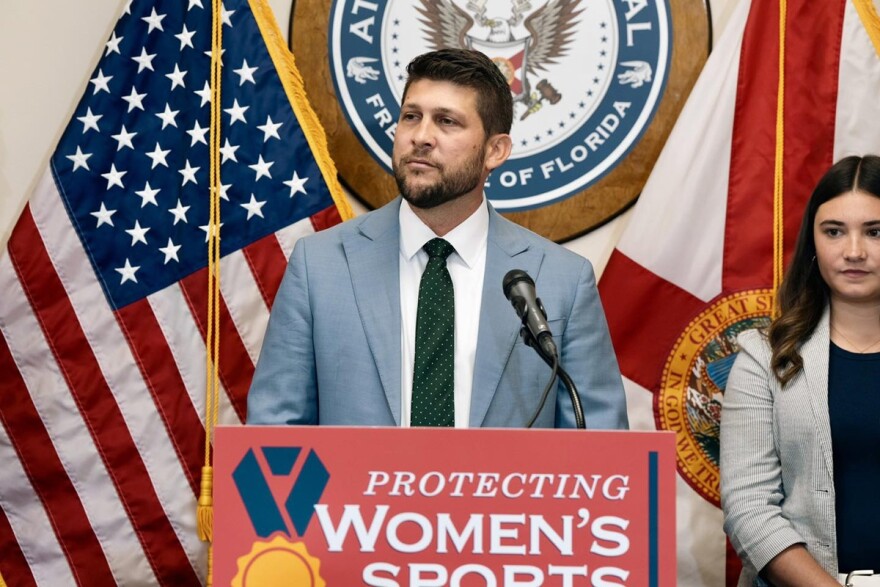Florida Attorney General James Uthmeier has appealed a federal judge's ruling that found him in civil contempt because of a letter he sent in April after she ordered a halt to enforcement of a new state immigration law.
Uthmeier's lawyers last week filed a notice of appealing U.S. District Judge Kathleen Williams' ruling to the 11th U.S. Circuit Court of Appeals.
As is common, the notice does not detail arguments that Uthmeier will make at the Atlanta-based appeals court. But the appeal is the latest move in an unusual dispute between Uthmeier and the Miami-based judge.
READ MORE: Florida AG Uthmeier seeks OK for out-of-state lawyers, cites staffing shortage
The issue stems from a law, passed during a February special legislative session, that created state crimes for undocumented immigrants who enter or re-enter Florida.
The Florida Immigrant Coalition, the Farmworker Association of Florida and two individual plaintiffs filed a lawsuit on April 2, contending, in part, that the law violates what is known as the Supremacy Clause of the U.S. Constitution because immigration enforcement is a federal responsibility.
Williams on April 4 issued a temporary restraining order to block enforcement of the law. She extended the temporary restraining order April 18 and directed Uthmeier to send a letter notifying police agencies that they could not enforce the law. The directive came after reports of arrests. Uthmeier sent such a letter April 18 but followed with an April 23 letter that spurred the contempt issue.
Uthmeier has argued that the temporary restraining order — and a longer-lasting preliminary injunction issued later — should only apply to him and local state attorneys because they were the named defendants in the underlying legal challenge to the law (SB 4-C).
In the April 23 letter to police agencies, Uthmeier reiterated that position and said he could not prevent police from enforcing the law "where there remains no judicial order that properly restrains you from doing so," according to Williams' June 17 contempt ruling.
ALSO READ: Florida attorney general identifies wrongful charges under halted immigration law
Williams said that statement and other wording in the letter violated her order, writing that in a "variety of ways, Uthmeier's April 23rd letter conveyed to law enforcement that they could and should disregard the April 18th letter's message that they were required by court order to cease enforcement of SB 4-C."
"Uthmeier's role endows him with a unique capacity to uphold or undermine the rule of law, and when he does the latter by violating a court order, the integrity of the legal system depends on his conduct being within the court's remedial reach," Williams wrote in the 27-page contempt ruling.
In a court filing in May, Uthmeier's lawyers said he complied with the temporary restraining order by not enforcing the law and notifying law-enforcement agencies about the temporary restraining order. The filing said Uthmeier was free to express his disagreement with Williams' decision in the April 23 letter.
"The attorney general has consistently abided by the court's order to cease enforcing (the law)," the document said. "Nowhere does the TRO (expressly or impliedly) require the attorney general to refrain from sharing his views about the order with law enforcement."
The filing also said Williams' reading of the April 23 letter "relies on one portion of one sentence, rather than reading (the) letter as a whole and in the context of what preceded it: the April 18 letter" and a legal brief that also was filed April 23.
To carry out the contempt finding, Williams ordered Uthmeier to file bi-weekly reports about whether any arrests, detentions or other law-enforcement actions had occurred under the blocked law — filings he has submitted.
Williams on April 29 issued a preliminary injunction to continue blocking the law, saying it likely was preempted by federal immigration-enforcement authority. In part, she pointed to the law requiring that violators go to jail and indicated that could conflict with federal authority.
Uthmeier also has appealed the preliminary-injunction ruling to the 11th Circuit Court of Appeals. He asked the appeals court and the U.S. Supreme Court for a stay of the preliminary injunction but was turned down. Such a stay would have allowed enforcement of the law while the legal battle plays out.








